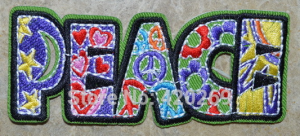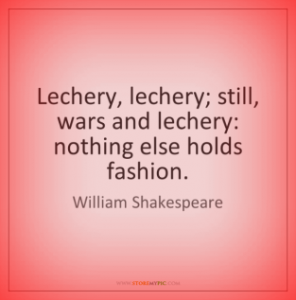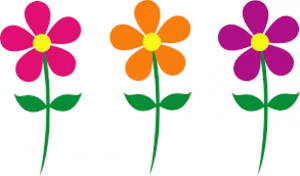By: Lyndsey McElhannon
Are hippies the modern day symbolist poets? How can symbolist poets be related to hippies? What was their sole purpose in writing styles? I set out on a mission to answer these questions for my readers. I feel we all know what the definition of a symbol is, but just in case someone reading this blog does not, per dictionary.com a symbol is, “Something used for or regarded as representing something else.” Naturally, my first thought was surely classifying oneself as a symbolist poet means nothing more than using symbols in poetry. While that may be true, further researching symbolist poetry I was pleased to find a much deeper rooted meaning of what encompasses a symbolist poet.
Symbolists have an approach when writing poetry enabling them to relate symbols that invoke one’s emotions and imagination. I suppose they could be considered hippie-like being the fact they have chosen to write about things that make them feel instead of reality. They write what comes to their imagination, usually using some sort of symbolism, whether it be considered “normal” poetry or not. They believe that using one’s imagination while having the ability to relate to a specific subject will be not only easier but more understanding as well. I know that when I read something that gets my imagination and emotions stirring, I am much more likely to finish and remember the material. Symbolist poets are known for being of French background. Charles Baudelaire is the most well-known symbolist. He is best known for Les fleurs du mal, translated in English, Flower of Evil. This work has two publications containing roughly 100 poems. I have chosen to include one poem I found beautiful from this collection. The poem is entitled, “Le Soleil” or “The Sun.”
Le Soleil (original text)
Le long du vieux faubourg, où pendent aux masures
Les persiennes, abri des secrètes luxures,
Quand le soleil cruel frappe à traits redoublés
Sur la ville et les champs, sur les toits et les blés,
Je vais m’exercer seul à ma fantasque escrime,
Flairant dans tous les coins les hasards de la rime,
Trébuchant sur les mots comme sur les pavés
Heurtant parfois des vers depuis longtemps rêvés.
Ce père nourricier, ennemi des chloroses,
Eveille dans les champs les vers comme les roses;
II fait s’évaporer les soucis vers le ciel,
Et remplit les cerveaux et les ruches de miel.
C’est lui qui rajeunit les porteurs de béquilles
Et les rend gais et doux comme des jeunes filles,
Et commande aux moissons de croître et de mûrir
Dans le coeur immortel qui toujours veut fleurir!
Quand, ainsi qu’un poète, il descend dans les villes,
II ennoblit le sort des choses les plus viles,
Et s’introduit en roi, sans bruit et sans valets,
Dans tous les hôpitaux et dans tous les palais.
— Charles Baudelaire
The Sun (translated text)
Along the old street on whose cottages are hung
The slatted shutters which hide secret lecheries,
When the cruel sun strikes with increased blows
The city, the country, the roofs, and the wheat fields,
I go alone to try my fanciful fencing,
Scenting in every corner the chance of a rhyme,
Stumbling over words as over paving stones,
Colliding at times with lines dreamed of long ago.
This foster-father, enemy of chlorosis,
Makes verses bloom in the fields like roses;
He makes cares evaporate toward heaven,
And fills with honey hives and brains alike.
He rejuvenates those who go on crutches
And gives them the sweetness and gaiety of girls,
And commands crops to flourish and ripen
In those immortal hearts which ever wish to bloom!
When, like a poet, he goes down into cities,
He ennobles the fate of the lowliest things
And enters like a king, without servants or noise,
All the hospitals and all the castles.
— William Aggeler, The Flowers of Evil (Fresno, CA: Academy Library Guild, 1954)
FLOWER POWER!!!
I have included a link if anyone is interested in reading up on Baudelaire and his life, https://www.poemhunter.com/charles-baudelaire/biography/ .
Symbolists are known for using ideas in their poetry that is anything but normal in ordinary poetry at the time. Baudelaire and the fellow symbolists were thought to be “less” than ordinary poets because of their eccentric writing styles. They were looked down upon because they were not “conventional.” According to Arthur Rimbaud, poetry should be a, “Systematic derangement of the senses.” Symbolists wanted to steer their poetry away from the norm, being realism and naturalism. I envision Baudelaire, Rimbaud, and the other symbolist poets sitting in a large field surrounded by beautiful flowers, smoking a joint, discussing the undeniable beauty surrounding them. For example, the Sun like in the poem above. Now please do not think that I am degrading them or their work in any way by me referring to them smoking pot. I just feel that they did not give a shit what people thought of them; they did whatever they wanted, and wrote however they wanted. I personally look up to them; the fact that they had the guts to step off the course of writing “conventional” poetry pretty much makes them badass. Of course, as I previously stated, other poets did not like the idea of writing about things not involving nature and realism. Symbolists were looked down upon for their new approach to writing poetry. Hey, I am all about being different! I say more power to them! Sometimes it’s nice to read about things that aren’t focused on reality; everyone needs an escape. I do compare them to hippies for the cheer fact of their determination to do as they pleased with or without approval from others. Poetry has evolved a lot throughout the years; I credit Baudelaire and the other symbolist poets for this. They introduced a different writing style with their eccentric approach to life like hippies introduced the idea of peace and love to the world.
Charles Baudelaire – Charles Baudelaire Biography – Poem Hunter. “Charles Baudelaire – Charles Baudelaire Biography – Poem Hunter.” PoemHunter.com. N.p., n.d. Web. 07 Feb. 2017.
“Lechery.” Dictionary.com. Dictionary.com, n.d. Web. 09 Feb. 2017.
Poets.org. Academy of American Poets, n.d. Web. 29 Jan. 2017.
“Poetic Modes: Symbolism, Imagism, Modernism.” Poetic Modes: Symbolism, Imagism, Modernism. N.p., n.d. Web. 29 Jan. 2017.
Supervert. “Le Soleil (The Sun) by Charles Baudelaire.” Le Soleil (The Sun) by Charles Baudelaire. N.p., n.d. Web. 07 Feb. 2017.
“Symbol.” Dictionary.com. Dictionary.com, n.d. Web. 07 Feb. 2017.
“Symbolist Movement | Glossary Terms | Poetry Foundation.” Poetry Foundation. Poetry Foundation, n.d. Web. 29 Jan. 2017.





